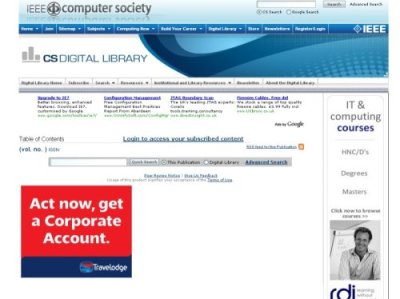Erik Duval has just blogged about the first issue of IEEE Transactions on Learning Technologies.
His blog post is available at http://erikduval.wordpress.com/2008/10/01/ieee-transactions-on-learning-technologies/
I’m glad to see the launch of a new journal in the field of learning technology and very glad to see that the content is going to be Open Access after a 12 month embargo during which it’s only available to subscribers. They’ve got a featured article that looks interesting “Capture, Management, and Utilization of Lifecycle Information for Learning Resources, Lasse Lehmann, Tomas Hildebrandt, Christoph Rensing, Ralf Steinmetz” http://www.computer.org/portal/cms_docs_transactions/transactions/tlt/featured_article/featured.pdf.
<rant> I may just be grumpy because the train strike is making my life difficult but there are two things about this journal (or -to be fair- IEEE’s journal system) that have already managed to frustrate me.
The first is that there is no publicly (non-subscriber) viewable table of contents – this may be a mix up because its the first issue – but apart from the featured article – I have no idea what’s in this issue.
The second is that the journal has access to PrePrints and Rapidposts.
‘PrePrints are papers accepted for publication in a future issue, but have not been fully edited. Their content may change prior to final publication. RapidPosts are articles that have been accepted for inclusion in a future issue. Content is final as presented, with the exception of pagination.’
This making available of content that is ‘in press’ is great and adds value for subscribers – but please – find a different word! ‘PrePrint’ – as confusing as it may be as a term – has very strong connections and a lot of established use in Open Access repositories. When I see that word I expect to find something I can access not a subscribers’ login screen.
I know this choice of words has nothing to do with the editors but frustrating potential readers isn’t going to incline me to return to the page. </rant>

Hi John,
As the Production Editor currently heading up TLT, I just wanted to address the issues you bring up here to dispel any confusion you or any other readers might have.
I’m sorry that you find our use of “PrePrint” confusing — although I understand that it may be used with a different connotation in other forums, this term seems to be common usage for the product we’re providing. For example, the ACM uses it similarly, and a quick check of wikipedia(http://en.wikipedia.org/wiki/Preprint) shows our defition as well. Given this fact, it seems that inventing a new term for something that has already been established might be more confusing than the situation as it currently stands.
If your complaint is less about our use of the term and more about our decision to keep this content paid rather than public, I would encourage you to consider that the PrePrint content is still the same content that our subscribers have paid for, so it doesn’t really make sense for us to provide the earlier versions for free while charging for the final product.
As for TLT’s table of contents, it is in fact viewable to the public and is currently accessible on the journal’s home page (http://www.computer.org/tlt). I hope you’ll be as pleased with our inaugural issue as we are.
Thanks for your interest and feedback,
Kimberly Sperka
Hi Kimberly,
thank you for your response.
I can now see the table of contents – perhaps I went there too soon.
With regards to the issue of the term ‘preprints’. I completely agree that ‘preprint’ the right term for the document at that stage.
My confusion and slight frustration is that as the preprint is the author’s version prior to the added value that journal publication offers this is most commonly the version that(depending on a publisher’s policy on Open Access) is allowed to be distributed and stored by the author (whether in a repository, digital library, or website).
To generalise – when authors sign over copyright to journals, it is for: peer review, editing, formatting, branding, and distribution. With a preprint the only one of these that is relevant is distribution which in a web environment is somewhat debatable. Because of this when i see the term ‘preprint’, I (rightly or wrongly) expect ‘free to access’.
Hopefully the Niso working group’s recommended practice on Journal Article Versions (JAV) will see wider use.
http://www.niso.org/publications/rp/RP-8-2008.pdf
I think I’m treating ‘preprint’ as ‘author’s original’ and you’re regarding ‘preprint’ as ‘submitted manuscript under review’.
I reiterate that I’m glad to see another peer-reviewed journal in this field.
kind regards,
John